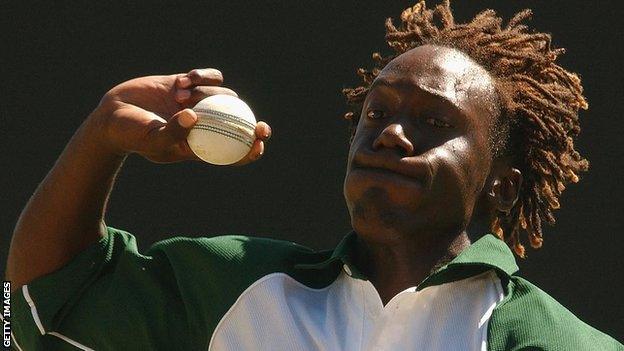Robert Mugabe: Henry Olonga takes 'no pleasure' from ex-president's death
- Published

Henry Olonga playing for Zimbabwe against New Zealand in 2003 - one of his last matches for his country, aged just 26
Zimbabwe's first black Test cricketer Henry Olonga, who was forced to flee the country after protesting against Robert Mugabe, says he takes "no pleasure" from the ex-president's death.
Mugabe died aged 95 on Friday.
He was ousted during a military coup in 2017 following years of violent repression and economic ruin.
"People have been saying perhaps I'll have a drink as a toast, but I get no pleasure from his death," Olonga said.
"In fact, it makes me incredibly sad, because for all he could have represented, he failed to scale the heights of someone like Nelson Mandela. He became a megalomaniac, a power-hungry tyrant, a dictator and a man who subjugated his own people while purporting to be representing them."
Olonga, who now lives in Adelaide, Australia, wore a black armband in support of a pro-democracy protest in Harare at the 2003 Cricket World Cup, which was jointly hosted by Zimbabwe, Kenya and South Africa.
He was joined by captain Andy Flower, and the pair issued a statement to journalists at the Harare Sports Club in which they denounced the "death of democracy" in their homeland.
The action made headlines across the world - and effectively ended their international careers.
Olonga was exiled from his homeland and faced death threats, fleeing to England and never playing for Zimbabwe again.
'Liberation hero tarnished his legacy'
Andy Flower (left) congratulates team-mate Henry Olonga after he ran out Justin Langer of Australia during a Test match in 1999
In his early presidency Mugabe was praised for broadening access to health and education for the black majority, but later years were marked by violent repression of his political opponents and Zimbabwe's economic ruin.
Olonga, the country's first black cricketer, said he is able to "give credit where it's due".
"He was critical in helping Zimbabwe attain its independence and freedom," Olonga, 43, told PA news agency.
"He also ensured that black people who didn't have it in the 1960s and 1970s could have the right to vote, although of course even the very first elections the independent Zimbabwe had were marred with alleged incidents of voter intimidation and violence.
"He was one of the liberation war heroes and that will never be taken away from him. But unfortunately the legacy of this man is that he'll be remembered as a vicious tyrant and dictator."
In 2013, for a special 麻豆社 5 Live programme aired 10 years after the famous black armband protest, former England head coach Flower said a farming friend affected by Mugabe's land reforms said it was his "moral obligation not to go about his business as usual during the World Cup", and that this changed his own view of Zimbabwe.
Flower knew that the chances of engaging the whole team in a protest were remote, so he decided to approach Olonga.
"I thought Henry might grab the concept and have the courage of his convictions to take a stand," added Flower.
"I also thought the fact that it would be one white Zimbabwean and one black one operating together gave the message the most eloquent balance."